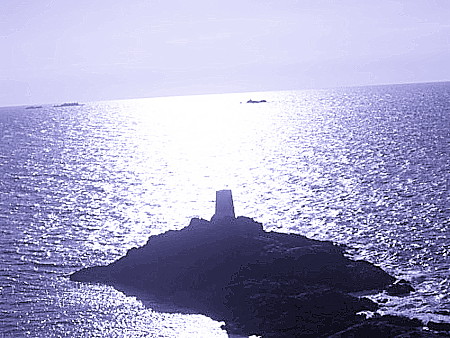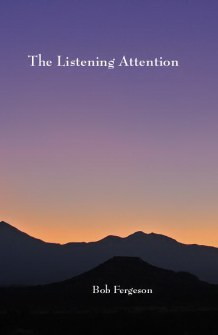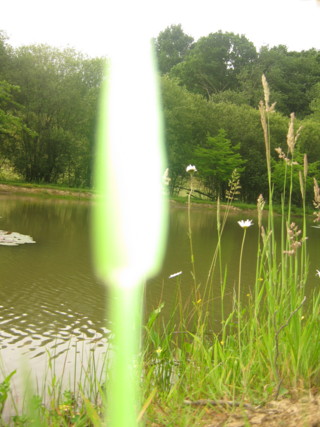September 2010
This Month's Contents:
Richard Rose's Psychology of the Observer:
The Path to
Reality Through the Self by John Kent |
Excerpt from The Listening Attention by Bob Fergeson |
"Inspiration Frustrations": A Poem by Jonathan Tran |
Stepping On Our Own Toes by Shawn Nevins |
Two Poems by Shawn Nevins |
Video: Saltwater Buddha Documentary Short |
Quotes |
Humor
Editor's Note
by David Weimer

We are fragile, and exist for a short time, or a time that feels very short, and then we are gone.
We are able to work toward something in the face of great opposition and survive suffering and strain far beyond our limits.
Impermanence permeates us and, yet, something inside of us feels the possibility for permanence.
Welcome to the Forum.
Send us your thoughts or tell us what we should include in a future edition.
Richard Rose's Psychology of the Observer:
The Path to
Reality Through the Self
by John Kent
 Foreward
Foreward
During the autumn of 1976, I first encountered Rose’s teaching in a Los Angeles college on a poster in the Psychology Department. From the last line on it: “The Final Observer is One,” I intuitively recognized that the person who wrote that “note in a bottle” to the rest of us drones in fantasyland had stepped outside our total realm into objective reality and Knew.
I joined the local group, then went to the Farm for two weeks in the summer of 1977 to meet Rose and the others. After finishing the first half of graduate school in 1979, I moved to Pittsburgh and spent six years actively involved with the group in all aspects. In 1985, I moved back to California to finish the PhD program in Counseling Psychology. In part, I intended to make my career and identity a form of ladderwork.
Another reason was that I knew I needed to totally immerse myself in Rose’s teaching, work through every single aspect of it to the best of my understanding, and compile it into one comprehensive treatise, for my own benefit as much as for anyone else’s. This manuscript was that dissertation. I hope it does service to Rose’s genius and helps seekers clarify the path for themselves.
~ John Kent, August 2005
Continue reading this dissertation excerpt.
The Listening Attention
Five excerpts from this small book of clarity.

"The Place of No Concern"
In the winter of 2000, something happened to me that answered my questions as to who I am and my relationship to life and death, the questions that had somehow haunted me, consciously or not, for most of my adult life. Soon after this event, I wrote in my notes, “I was taken beyond myself into the place of no concern.” The years of wandering, of alternating between pleasure and misery, came to an end, along with the searching and longing it generated. Paradoxically, I saw that in all that time I had never really moved. Rather, I simply woke up. (p.8)
True adventure is not in outward grandiose imaginings, whether in waking sleep or whatever, but rather in a steady inward movement, an uncovering of all that is hidden and false in ourselves. It is the greatest expedition we can make, for it leads to real peace and true awakening. This precipitous moment of turning our attention around and looking within is worth more than any bardo of lucid fantasies, for it can lead to real Self-knowledge, to Who we really are. As G.I. Gurdjieff said, “Life is real only then, when I am.” (p. 46)
If God is eternal, and we are as him, then he was there before the mind, too. We left God by going into, and becoming identified with, the body/mind and its ever-changing flux. To find God, or our Source, we must therefore go back, not further out into the wilderness of the mind, the matrix of images. These images are secondary to the mind that creates and projects them, so how can we give them greater meaning than the mind, and even to our observing of them? What is required is a reversal, a retreat, a going within. This will naturally lead us to look in an inner direction, away from images drawn from the memory, and even the image-creating mind itself. (p. 47)
When the still-point is finally reached, even if only for a moment, it is unmistakable. If we have allowed ourselves to hone our intuition and clear our thinking, we will find that this silent place within is not just a concept, but very real. The movement necessary to turn our attention back away from the outer and inner movies of the mind and senses is found to be also something real, and not a thought or concept at all. We find too, that we forget, and are carried back into the mind at every instant.
If we come back to the center, time and time again, during and despite every trial, we find we are becoming less of the world and more of the silence. In any situation in life, no matter how difficult or how often we forget, if we eventually return to the still-point as our anchor, we find we are becoming one with it. (pp. 54-55)
The Kingdom of Heaven is truly within, and we will not find it by taking our pleasure and meaning from without, from the world and its ceaseless change and pain.” (p. 69)
The Listening Attention will be published by the TAT Foundation Press in October 2010. Visit Bob's Mystic Missal website or his two companion sites, The Listening Attention and Nostalgia West Spiritual Photography.
Inspiration all around
How come it just can't be found?
Journal writing every day
Burnt to ashes just today
Ladder work is going down
Who's that seeker quitting now?
Weekly meetings, here we go
Finally make it; no one shows
Inspiration all around
How come it just can't be found?
Dream analysis helps to guide
But insomnia just won't subside
Online group is due, alright
Internet is down tonight
Isolation works for me
Roads are closed? This can not be!
Inspiration all around
How come it just can't be found?
Meditation promise to keep
Now I'm starting to fall asleep
Always books for me to read
Son has rolled them smoking weed
Workshop out of town then
Wife's complaining yet again
Inspiration all around
How come it just can't be found?
~Jonathan Tran
Stepping On Our Own Toes
by Shawn Nevins
7/7/07
 What do you really know?
What do you really know?
“When will I realize that everything is an illusion?” “How do I give up my ego?” “How do I quit doing?” These questions are raised by an inordinate number of people of late. It’s like farmers worrying about harvest time while the weeds are overgrowing their emerging crops. This premature questioning results, in part, from neo-Advaita teachers who portray the spiritual search as a waste of time and self-realization as a conceptual sleight-of-hand. However, even those who espouse a path of action risk explaining too much of the process that, in retrospect, led them to a spiritual realization. Explaining too much of the process may create a generation of seekers who think they know where they are headed.
Thinking you know where you are headed or what is just around the corner is worse than not knowing. It’s like explaining the plot of a mystery before you read the book. The author’s attempt to guide you into the world of the story is ruined by your foreknowledge. The tale’s emotional component and its potential to affect you are swept away and your reaction to it is flattened. Pre-conception leads to a pre-ordained conclusion.
Of course, seekers are always looking for the formula. I recall Richard Rose saying many times that we were asking the wrong questions. He was right. Someone recently asked if I had given up during my spiritual search. They clearly were trying to find a formula, and then isolate the catalyst – thinking, “That’s it! I have to give up, then I’ll be enlightened.”
You can’t practice this end game. That’s like the Asian monks who composed their death poems years before they died. That’s not facing facts. That’s imagining “how it would be if….”
Realize that describing the enlightened viewpoint is like describing a dream. You either find a nod of recognition or you don’t. Taking action based on this dream description is a bad idea. You ask me how I see the world and I reply, “It is like a painting on water.” You go home and think to yourself, “The world is a painting on water. Why don’t I see it? What is wrong? How do I see this?”
Maybe I should have said nothing; maybe you’ll have a feeling of recognition. Either way, don’t run about your brain drawing conclusions from a statement.
As has been said before, start with the basics. What are you most sure of? That’s where you have to begin being honest. You know this table is solid. Sure, some physics book may tell you otherwise, but hit the table with your head and you’ll know truth. Now look for what is solid in you. Look again and again and again, and determine to keep looking till you find that which is beyond questioning.
Two poems
by Shawn Nevins
|
Somewhere inside of me
*
"Deep Within Summer"
The grasses tell me of time –
Pretending is ever disappointing.
|
Video: "Saltwater Buddha" Documentary Short
If you don't see a video clip above, then go directly to youtube.com.
Quotes...."At this point an almost accidental realization is necessary. This realization is not very profound, it is simply a realization in which we notice that we, or something within us, is watching this whole process. We take a step forward, and reach a level from which the mind will never be lost in forgetfulness. We have become a Process Observer. "From this point, as we look to the right, we notice that we can also look at awareness, and we can be aware of consciousness, and of looking at ourselves looking indefinitely. We do not take a step forward, but are taken forward from here, by that which seems to be an accident, —an accident which does not come unless we have struggled relentlessly to find that which was unknown to us, by a method which could not be charted because the end or goal was unknown. We must have first become a vector. We must first have spent a good period of time studying our own awareness and consciousness with our own consciousness until we accidentally or by some unknown purpose, —enter the source of our awareness." ~From: Psychology of the Observer, (p.132), (c) Richard Rose, 1977, 2001.
|
Humor....
that we have ascended from apes.
Everybody else takes it for granted
that they are descended from gods.”
~ anthropologist Marshall Sahlins
*
"He is a self-made man
and worships his creator."
~ John Bright
*
"Some cause happiness
wherever they go;
others, whenever they go."
~ Oscar Wilde
Reader Commentary
Thanks for the Forum.
I'm in the middle of watching the Peace
Pilgrim video... pretty amazing... inspiring.
~ Augie
Hope you guys keep up the great work! (I enjoy the forum publication immensely)
~ Jim Ravenscroft, EnlightenmentDudes.com
Did you enjoy the Forum? Then buy the book!
Beyond Mind, Beyond Death
is available at Amazon.com.



